Raising the Divine Temple of the Bhāgavat and Unfolding the Ultimate Conception of Parakīya
by Śrīla Bhaktisiddhānta Sarasvatī Ṭhākura Prabhupāda
(from Śrīla Prabhupādera Harikathāmṛtam –The Immortal Nectar of Śrīla Prabhupāda’s Sermons on Lord Hari)
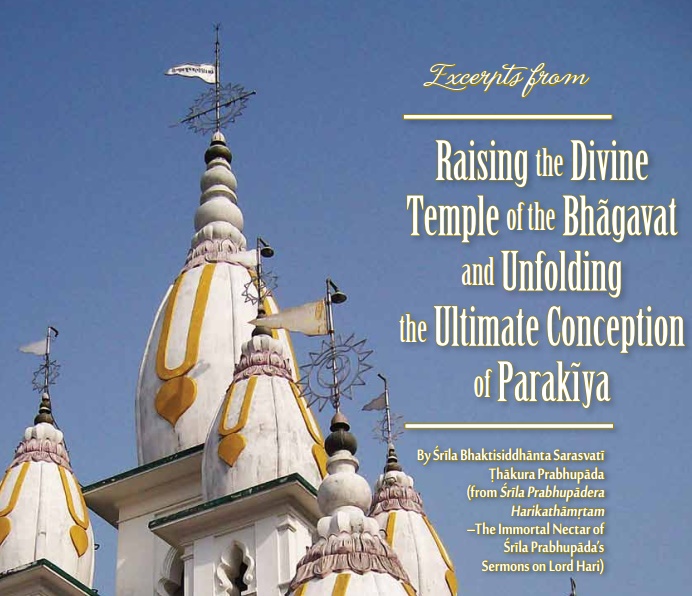
The vast palace of the Gauḍīya Maṭha has been externally manifest, but now there are several important sacred texts that must also be manifested in this world in order to perfectly establish and preserve the subject matter of internalized pure devotional service to Śrī Hari (hari-bhajana). By manifesting the temple [In the original Bengali article, the words used were kīrtana-carcā-mandira and nātya-mandira. A kīrtana-carcā-mandira is the part of the temple wherein the message of Godhead is discussed, and the nātya-mandira is the section in front of the altar where the devotees worship the Lord, especially through saṅkīrtana.] made of both grantha-bhāgavat, the sacred texts related to Bhagavān, and bhakta-bhāgavat, the devoted worshippers of Bhagavān who constantly sing His divine glories, the transcendent topics about Śrī Hari will be propagated throughout the world for far longer than by manifesting temples of marble and brick.
A person’s lifelong accruement of assets has been engaged in establishing a place of refuge, a fort from which to preach the message of the Supreme Lord. Yet one taking shelter there must still protect himself from the fellowship of ungodly folk. That is to say, he must save himself from the chaotic sway of this degraded age and preach the message of Godhead from his own station. Consequently, there is a need to disseminate many more sacred texts. The topic of devotional service to the Supreme Lord (bhagavat-bhakti) will remain in this world if the temple made of these sacred texts and of the ideal lives of His devoted worshippers is manifest.
The Śrīmad-Bhāgavatam
It is essential that a genuine elucidation on the Tenth Canto of the Śrīmad-Bhāgavatam be written. It must not merely be the excess verbosity of scholars who are expert in utterance, nor an exhibition of prākṛtā-sahajiyās, the capricious imitationists who accept their cheaply conceived fantasies as part of absolute reality. Rather, for those who earnestly thirst to serve Transcendent Beauty, and in whom ardent spiritual greed for such service has arisen, this commentary will be considered most desirable to read.
There is no treatise in existence that compares to the Śrīmad-Bhāgavatam. Its narrations are not mythology. One who makes a truly impartial study will realize that a sacred text like the Śrīmad-Bhāgavatam has never been excelled, nor can it ever be. Within the Śrīmad-Bhāgavatam, progressively evolved conceptions of the Absolute are demonstrated in sequence. The preliminary conception is doubtfulness of the existence of any supreme truth (saṁśaya). Then come denial of the personal Absolute (nāstikya), acceptance of the Absolute as impersonal and featureless (nirguṇa), the theory that God exists but is neuter (klīva), the potent Godhead (puruṣa) and then the Potent and His Potency (mithuna). The conception next evolves to svakīya, the eternal matrimony of the Supreme Male and His consort, and finally parakīya, the paramour conception of the Divine Couple.

This final theme, kṛṣṇa-līlā, appears in the Tenth Canto, so what was the necessity of composing the previous nine cantos? In these, a foundation is made in preparation for introducing the absolutely autocratic loving affairs of the supremely independent Śrī Kṛṣṇa. These loving affairs are the paramount subject of the Śrīmad-Bhāgavatam. The first nine cantos present the rudimentary theories of doubt up to the conception of wedded love of God, and in the Tenth Canto, in chapters like Gopī-gīta, the paramour conception is revealed.
Prior to the appearance of Śrī Caitanya Mahāprabhu, many may have examined the Śrīmad-Bhāgavatam, but only those who have read the Śrīmad-Bhāgavatam after reading His biographical anthology Śrī Caitanya-caritāmṛta – which was compiled by Śrīla Rūpa Gosvāmī’s foremost adherent, Śrīla Kavirāja Gosvāmī – and have made their study of the Śrīmad-Bhāgavatam while remaining inside its shelter, take to heart its real purpose and explicit theme.
Professional orators and prākṛtā-sahajiyās conceal the divinely intended method of narrating the Śrīmad-Bhāgavatam. The Śrīmad-Bhāgavatam must be expressed in virtue of Śrī Caitanya-caritāmṛta and in line with the path of Śrīla Rūpa Gosvāmī. The genuine commentary of the Tenth Canto shall not be written so as to conceal this method. Countless sahajiyās have delivered such commentaries simply for the gratification of general people. Thus they have cleared a path to hell for themselves and others.
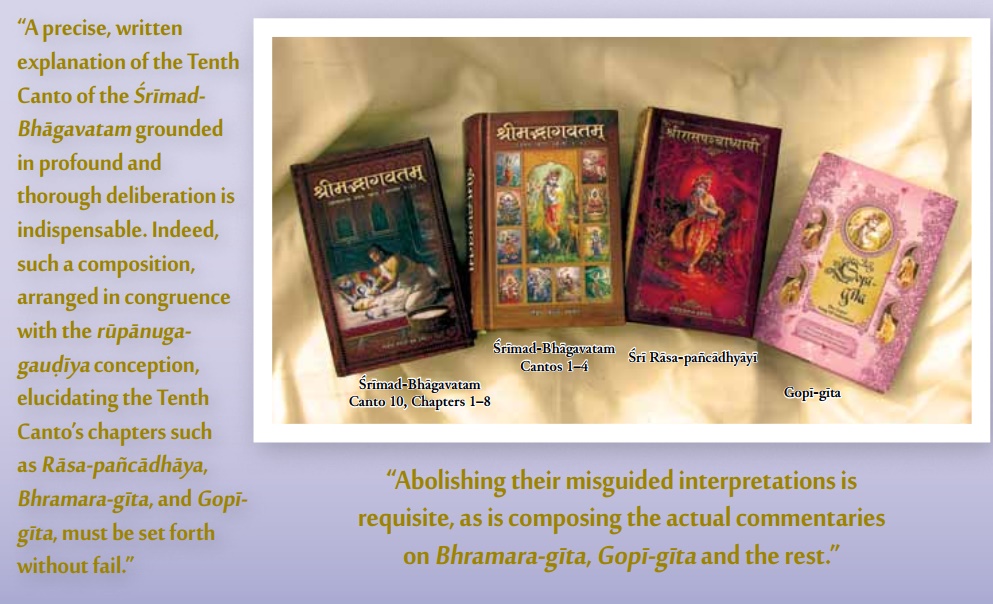
Within the Śrīmad-Bhāgavatam the increasing excellence of the intrinsic love between the Supreme Lord (viśaya, or sevya) and His servitors (āśraya, or sevaka) is readily traced through each of the successive stages from contracted (saṅkucita); to slightly budding (īṣat-mukulita); developing, or flowering (puṣpita); expanding, or blooming (vardhita); mature, or fully developed (paripuṣṭa); and finally profusely exuberant, or perfected (prapakva). [Compare with the story of Gopa-kumāra in Bṛhad-bhāgavatāmṛta. In each successive chapter, Gopa-kumāra meets devotees who possess progressively higher degrees of love for Bhagavān. ]
Similarly, as the wish-fulfilling tree of the Śrīmad-Bhāgavatam unfolds, all conceptions of the Supreme Absolute are chronicled as they evolve through doubt, the denial of the absolute, the impersonal absolute, the personal but impotent God, the Potent, the Potent with His Potency, the conception of wedded love with the Supreme, and finally the superlative conception of parakīya, the Supreme as a paramour. For one who anxiously longs to serve Transcendent Beauty through the parakīya conception, there is no entity that can award the fruit of their determined endeavour other than the wish-fulfilling tree of the Śrīmad-Bhāgavatam. Throughout all the material universes, or beyond them, or across the Virajā in Brahmaloka (the endless incorporeal firmament), or even in any of the innumerable Vaikuṇṭha planets, there is no entity besides the Śrīmad-Bhāgavatam that is capable of yielding the desired fruit of such aspirations.
In considering the parakīya conception, four gradations of increasing excellence are observed. Initially it is overly tender and immature (taruṇa). Gradually it becomes astringent (kaṣāya), then ripe (pakva), and finally fully ripened (prapakva). [These four gradations are illustrated as follows: The stage of taruṇa is seen in the tender love of the gopīs before their first meeting with Kṛṣṇa (pūrva-rāga). The stage of kaṣāya is seen in the love of those gopīs who were checked by their husbands and other family members when Kṛṣṇa called them with His flute, whereas the stage of pakva is seen in the love of the gopīs who abandoned everything and were able to go to Him at that time. When Kṛṣṇa left the gopīs after rāsa-līlā, He submerged them in separation from Him and removed their pride (each gopī had perceived that Kṛṣṇa was dancing exclusively with her and thus she developed pride in her extreme good fortune – saubhāgya-mada). Subsequently, they sang Gopī-gīta feeling the severe pain of separation from Him. When He reappeared, mahā-rāsa began. The gopīs’ condition at that time illustrates prapakva, or fully ripened parakīya-bhāva. It is solely this final stage of parakīya-bhāva that Kṛṣṇa wants to relish.] These gradations can be perceived by the topmost devotees who earnestly long to serve Transcendent Beauty. That is to say, it can be perceived by the rasika and bhāvuka bhaktas as they relish the transcendental nectar of the Śrīmad-Bhāgavatam.
*****
By hearing the explanations of the Śrīmad-Bhāgavatam sung by a liberated paraṁhaṁsa like Śukadeva Gosvāmī, a qualified listener like Parīkṣit Mahārāja, who was fully convinced regarding the temporary nature of human life, [The world emperor, Parīkṣit Mahārāja, had been cursed to die in seven days. Thus he renounced his kingdom and heard Śrīmad-Bhāgavatam from Śrīla Śukadeva Gosvāmī without interruption until his death.] will at once become immersed in relishing the nectar of the Śrīmad-Bhāgavatam and remain there forever. Thereafter, such a qualified listener forgets all his prior lower interests that were unrelated to Kṛṣṇa and becomes completely untouched by any worldly attachment.
A precise, written explanation of the Tenth Canto of the Śrīmad-Bhāgavatam grounded in profound and thorough deliberation is indispensable. Indeed, such a composition, arranged in congruence with the rūpānuga-gauḍīya conception (the conception of Śrī Caitanyadeva’s most distinguished apostles headed by Śrīla Rūpa Gosvāmī), elucidating the Tenth Canto’s chapters such as Rāsa-pañcādhāya, Bhramara-gīta and Gopī-gīta, must be set forth without fail. The world is in want of actual beauty or rūpa, the conceptions propounded by Śrī Rūpa, for currently only ku-rūpa abounds, misshapen conceptions that are opposed to his. In order to broadcast their cleverness and prematurely profess their own elevated status, the sahajiyās recklessly amuse themselves by dallying with these lofty branches of the Tenth Canto. Abolishing their misguided interpretations is requisite, as is composing the actual commentaries on Bhramara-gīta, Gopī-gīta and the rest.
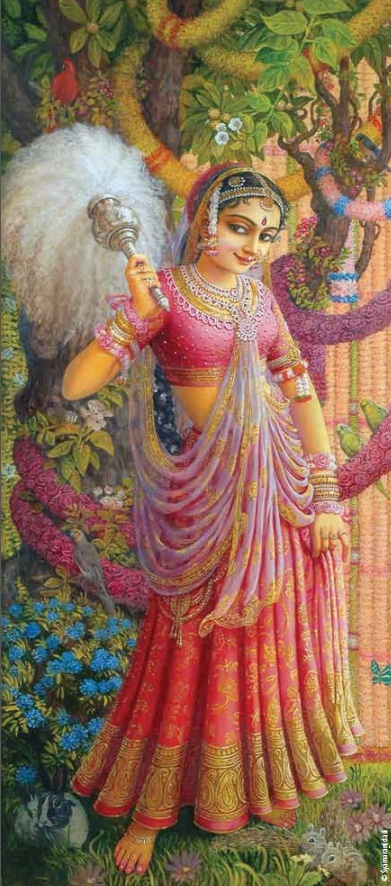
Negation is not Enough
Until now we have simply occupied ourselves in the process of negation, rejecting atat (literally, ‘that which is not’). For eight years our periodical, Gauḍīya, has extensively discussed such issues. The sahajiyās can be greatly benefited by studying these articles. However, it is not possible to become advanced in the subject matter of hari-bhajana if we limit the scope of our endeavours either to simply negating atat or to performing favourable action.
*****
While the benefit of singly performing favourable actions that are related to bhakti is not lost even after unlimited lifetimes, still, in this very lifetime, those actions will grant neither emancipation from the mortal sphere, nor the perfection of the soul, nor the ability to perform real hari-bhajana. The attainment of Kṛṣṇa will remain completely out of reach for one who does not become captivated by His graceful, beautiful form and qualities. But those who have developed real greed for rūpa, Graceful Beauty, who are longing to serve Graceful Beauty, they alone gain intimacy with Kṛṣṇa.
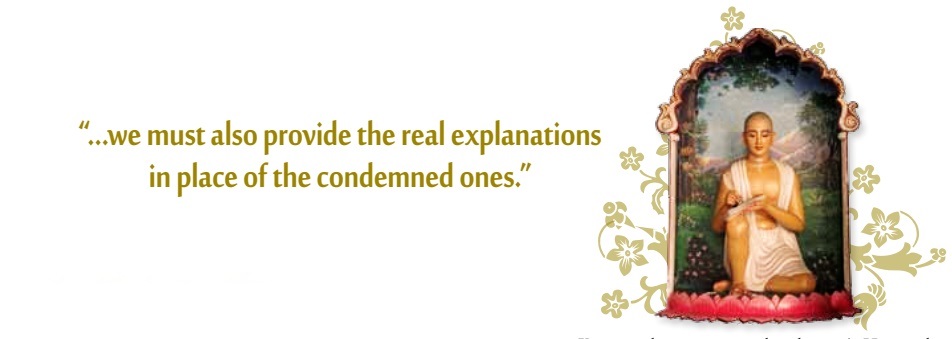
Searching for Graceful Beauty
The name ‘Śrī Rūpa’ is what is understood by the word rūpa, or ‘Graceful Beauty’. Only they who long to serve Graceful Beauty know the meaning of hari-bhajana. They completely depend on the guidance of Śrī Rūpa and place all their hopes in following him. The lotus feet of Śrī Rūpa Mañjarī are their sole object of adoration and service, and eternally remaining at her lotus feet is the only perfection for which they yearn. It is they who are truly searching for Graceful Beauty. The commentary on the Tenth Canto of the Śrīmad-Bhāgavatam must be fashioned for them.
It is true that we do not approve of the fraudulent interpretations of Bhramara-gīta and Gopī-gīta propounded by the sahajiyās, but then we must also provide the real explanations in place of the condemned ones. Simply rejecting adverse elements by declaring ‘not this, not this’ offers no real assistance. The positive element, ‘it is this’, must be established. Rejecting adverse elements is but negation in the absence of any positive activity.
The impersonal aspect of the Absolute, which is without any comprehensible features, is designated by the word tat, which literally means ‘that’. Simply trying to realize tat by exhaustively negating all limited matter is not enough. Leaving aside the dry investigation of tat, one must enter into the pastimes of saḥ, which literally means ‘He’. He – the Absolute Personality [‘Absolute Personality’ appears in English in the original Bengali article.], the infinite reservoir and original perfection of all transcendent features. One must enter into His pastimes, by sequentially realizing the true and absolute nature of His name, His form, His qualities, and the unique glories of His intimate associates.
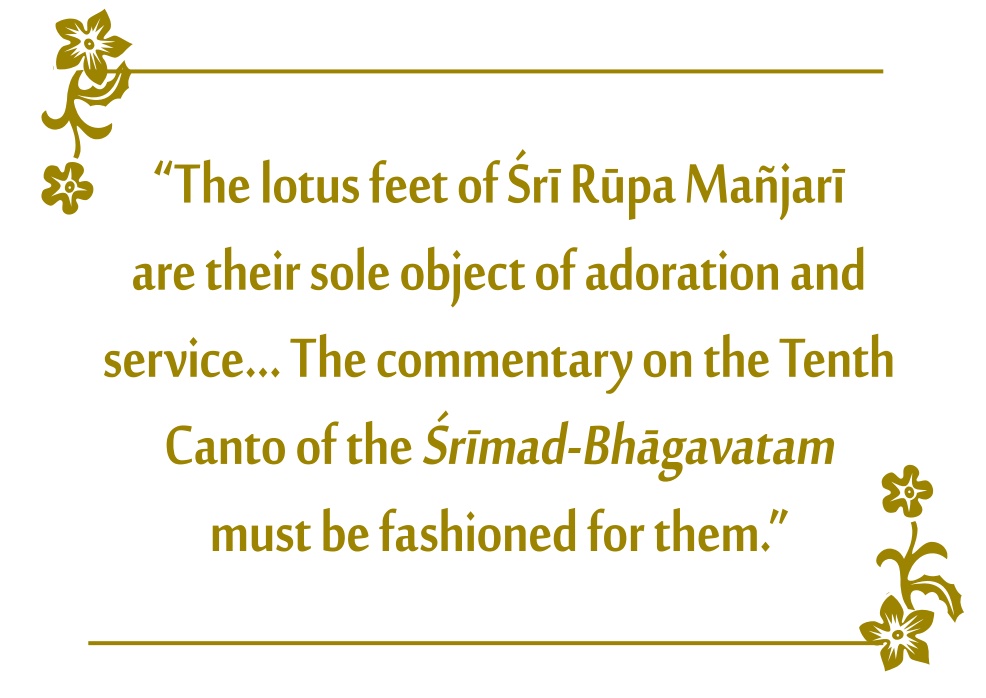
He is the divine nectar (rasa).” He is the absolute form of all sublime nectarean humours in their entirety. Śrīla Rūpa Gosvāmī explains:
prasṛmara-ruci-ruddha-tārakā-pāliḥ
kalita-śyāmā-lalito
rādhā-preyān vidhur jayati
Śrī Kṛṣṇacandra is supremely glorious! He is the condensed form of all the eternal, supra-mundane rasas. Indeed, He has not neglected the full expression of any divine sentiment. Just see how He subjugates the extremely submissive gopī Tāraka, just as the vernal full moon outshines a tiny star – her own effulgence totally engulfed by His brilliance. And Pāli, who is also controlled by Him, is just like a constellation, keeping the moon at her bosom. His rays overpower her as well. When the vernal full moon accepts the night sky as a playground, the atmosphere becomes ideal for love dalliance. In the same way, Śrī Kṛṣṇa makes Śyāmā, who is like the dark blue vault, and Lalitā, who is love dalliance personified, His very own. He comes under the control of the prema of Śrīmatī Rādhikā, who is the embodiment of mahābhāva and the origin of all the yūtheśvarīs, just as the full moon comes under the powerful influence of the Rādhā-constellation in the spring season. Śrīmatī Rādhikā’s love completely eclipses and defeats Him. She is His everything, without which He is just the lonely moon.
The Pinnacle of All Our Expectations
We will follow Śrī Upadeśāmṛta, the essential ambrosial commandments propounded by Śrīla Rūpa Gosvāmī. We will abandon what is unfavourable and accept what is favourable, but we will never consider the practice of accepting what is favourable to be enough to maintain the progressive flow of our bhakti. We will not become degraded, losing our healthy spiritual consciousness like the epileptic who, tortured by recurring seizures, violently falls to the ground unconscious.
Filled with intense enthusiasm, we will actively cultivate the tendencies of our minds, bodies and words in the service of Kṛṣṇa’s name and character (kṛṣṇa-anuśīlana), situate ourselves in Mathurā and Vraja – the fully transcendental facsimiles of Kṛṣṇa’s unmanifest eternal abodes – and sing the glorification of His holy name and sublime nature. Thus we will follow the clear path set forth by Śrīla Rūpa Gosvāmī. Then we will be able to engage in smaraṇa (the act of meditating on Kṛṣṇa and thus remembering Him constantly).
We will attain permanent residence on the bank of Rādhā-kuṇḍa in the beautiful forest grove belonging to our most worshipful Goddess. Remaining there forever, we will engage in service to the Divine Couple under the direction of our eternal guides, whose hearts are the permanent resting place of love for Kṛṣṇa (āśraya). Outwardly we will never leave the shelter of Kṛṣṇa’s holy name, and internally, enveloped in spiritual time – the eternal eightfold divisions of the day (aṣṭa-kāla) – we will serve the most cherished beloved of King Vṛṣabhānu’s daughter. That is, we will serve Śrī Kṛṣṇa, the most beloved of Rādhārāṇī, for all time. This achievement is the pinnacle of all our expectations. We have no aspiration besides this. Furthermore, we cannot conceive that any higher aspiration exists even for greatly liberated souls.
The Compassionate Gift of Śrī Caitanya
In truth, our divine guide (śrī guru), who is the beloved servant of Kṛṣṇa; the holy name of Kṛṣṇa; the Śrīmad-Bhāgavatam, which unfolds the pastimes of Kṛṣṇa; Śrī Śrī Rādhā-Govinda Themselves; and Śrī Caitanya who is known as Śrī Gaurasundara, the combined form of Rādhā and Kṛṣṇa, are all non-different features of the Absolute Truth. We need not become like the fruitive workers and empiricists, who try to fulfil all their separate interests by the worship of five deities (pañcopāsanā [The unauthorized system of pañcopāsanā entails worship of five principal controllers of the material universe: Viṣṇu, Śiva, Ganeśa, Sūrya and Durgā. Adherents of the pañcopāsanā system consider the forms of these five deities temporary and imaginary and meditate on them as a means to ultimately merge in impersonal brahma.]). Their service is never meant for the pleasure of Kṛṣṇa. Instead, we will render truly pleasing service to Śrī Kṛṣṇa in five ways to His five non-different features. First we will serve Him in His aspect of His own beloved servant, our divine guide. Second, we will serve Him as His holy name, His incarnation as transcendental sound. Third, we will serve Him as the Śrīmad-Bhāgavatam. Fourth, we will serve Him as Rādhā-Kṛṣṇa. And fifth, we will serve Him as Śrī Gaurasundara.
Furthermore, we will worship Kṛṣṇa with all five primary transcendental humours (pañca-rasa) – as devotee, servant, friend, guardian and lover. By becoming the devoted follower of Śrīla Rūpa Gosvāmī (rūpānuga), we will worship Kṛṣṇa in the paramour conception of madhura-rasa, which completely contains all five rasas.
We will not be content simply by rejecting the unfavourable, nor will we expect to flourish in bhakti simply by accepting the favourable. Rather, we will always actively cultivate the tendency to arrange for Kṛṣṇa’s pleasure (kṛṣṇa-anuśīlana).
Śrī Caitanyadeva appeared before us as embodiment of infinite magnanimity, compassion and kindness (audārya-vigraha), for He freely bestowed upon us unnata-ujjvala-rasa, the most elevated, brilliant conception of devotional service in paramour love, which had not been revealed for millions of aeons.
By immersing ourselves in the endless ocean of His magnanimity we will become the rightful recipients of that same rare treasure. Following in the footsteps of Śrī Svarūpa Dāmodara Prabhu, His most confidential companion, we will recite:
śāmyac-chāstra-vivādayā rasa-dayā cittārpitonmādayā
śaśvad-bhakti-vinodayā sa-madayā mādhurya-maryādayā
śrī-caitanya dayā-nidhe tava dayā bhūyād amandodayā
( Śrī Caitanya-candrodya-nāṭaka (8.14 )
O Śrī Caitanya Mahāprabhu, ocean of compassion! May Your auspicious mercy be awakened everywhere. It easily dispels all kinds of mundane lamentation, and it illuminates everything with purity. It thoroughly awakens supreme transcendental bliss and removes all confusion arising from disparities among scriptures. Your auspicious mercy bestows all of the transcendental humours headed by paramour love and intoxicates the soul, thus vanquishing his absorption in his mortal frame. In other words, because he is situated in the fully condensed bliss of separation, his heart surges with divine madness and delusion. Your mercy perpetually stimulates bhakti’s own delightful nature, so that by the influence of the original transcendental Cupid, profuse ecstatic transformations are aroused that plunder the soul’s faculty of discrimination between right and wrong. The appearance of Your mercy heralds the complete cessation of all of the soul’s selfish desires and at the same time, it confers the last limit of divine sweetness. Your boundless mercy, in the freedom of unmeasuring love, recklessly distributes the most valuable benediction without any restriction. Please, awaken Your causeless mercy within my heart.
Translated from Śrīla Prabhupādera Harikathāmṛtam published by Śrī Caitanya Maṭha
(First published in Rays of The Harmonist No.17 (Kārttika 2007))
